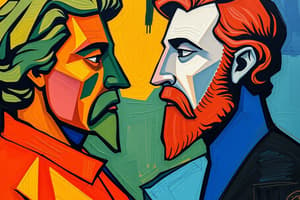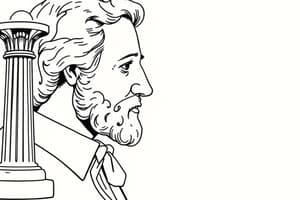Podcast
Questions and Answers
Who is considered the creator of liberalism?
Who is considered the creator of liberalism?
- Aldous Huxley
- Adam Smith
- Thomas Jefferson
- John Locke (correct)
What did John Locke believe regarding government?
What did John Locke believe regarding government?
Governments should be based on the consent of the governed and protect life, liberty, and property.
Which concept is Montesquieu known for in his political theory?
Which concept is Montesquieu known for in his political theory?
- Natural Rights
- Separation of Powers (correct)
- Laissez-Faire Economics
- Social Contract
Thomas Jefferson was the principal author of the ______.
Thomas Jefferson was the principal author of the ______.
What is Adam Smith known as?
What is Adam Smith known as?
John Locke supported the divine right of kings.
John Locke supported the divine right of kings.
What does the term 'Enlightenment' refer to?
What does the term 'Enlightenment' refer to?
What economic system is characterized by private ownership and profit generation?
What economic system is characterized by private ownership and profit generation?
The ______ is a bill of rights entrenched in the Constitution of Canada.
The ______ is a bill of rights entrenched in the Constitution of Canada.
Which of the following is NOT one of the core values of classical liberalism?
Which of the following is NOT one of the core values of classical liberalism?
What does the term 'Collectivism' refer to?
What does the term 'Collectivism' refer to?
Flashcards are hidden until you start studying
Study Notes
Classical Liberalism Overview
- Classical liberalism emphasizes individual liberties and rights, advocating for a government that is accountable to the people.
John Locke
- Creator of liberalism; emphasized natural rights: life, liberty, and property.
- Advocated for the social contract; believed government should operate with the consent of the governed.
- Argued against absolutism and divine right of kings, suggesting that power derives from the people.
- Authored "Two Treatises of Government," promoting the idea of revolution against tyrannical rule.
Montesquieu
- Influential classical liberal thinker who introduced the concept of separation of powers in governance.
- Proposed a balanced government divided into three branches: executive, legislative, and judicial.
- Supported checks and balances to prevent any branch from becoming too powerful.
- Advocated for civic engagement and awareness of laws among citizens.
Thomas Jefferson
- Founding Father of the United States, principal author of the Declaration of Independence.
- Served as the third President, significant advocate for individual liberties and democracy.
Adam Smith
- Recognized as the Father of Capitalism; promoted laissez-faire economics and individual freedom in market practices.
- Suggested that individuals acting in their self-interest ultimately benefit society.
- Criticized mercantilism and argued for a free market economy, notably in "The Wealth of Nations."
- Developed the theory of the invisible hand, asserting that markets regulate themselves with minimal government intervention.
Agricultural Revolution
- Marked improvements in farming methods, leading to increased population and demand for goods.
The Renaissance
- Described as a "rebirth" emphasizing education, art, and critical thinking in society.
Enlightenment
- An intellectual movement from the 1650s to the 1780s focused on reason and individualism, laying the groundwork for liberalism.
Industrial Revolution
- An economic movement that contributed to the development of liberal thought.
Absolute Monarchy
- A form of government where the monarch possesses unrestricted power over the state and its citizens.
Authoritarianism
- Characterized by indefinite political rule, often in a single-party system; transitions to democracy referred to as democratization.
Capitalism
- An economic system where trade and industry are primarily privately owned, focused on profit generation.
Charter of Rights and Freedoms
- A bill of rights entrenched in Canada's Constitution, established as part of the Constitution Act, 1982.
Core Values of Classical Liberalism
- Emphasizes liberty, individualism, skepticism about power, rule of law, civil society, spontaneous order, free markets, toleration, peace, and limited government.
Collective Norms
- Cultural rules that dictate appropriate behavior within a society.
Collectivism
- Focuses on the needs of the group over individual interests in social organization.
Studying That Suits You
Use AI to generate personalized quizzes and flashcards to suit your learning preferences.




